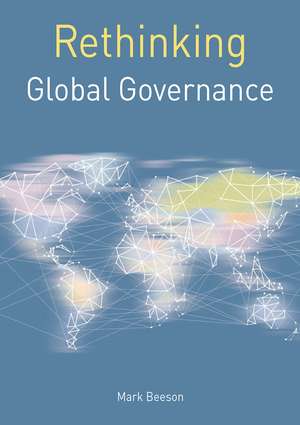Rethinking Global Governance: Rethinking World Politics
Autor Mark Beesonen Limba Engleză Paperback – 4 mar 2019
Preț: 250.01 lei
Preț vechi: 304.80 lei
-18% Nou
Puncte Express: 375
Preț estimativ în valută:
47.85€ • 49.77$ • 39.50£
47.85€ • 49.77$ • 39.50£
Carte tipărită la comandă
Livrare economică 12-26 aprilie
Preluare comenzi: 021 569.72.76
Specificații
ISBN-13: 9781137588609
ISBN-10: 1137588608
Pagini: 272
Dimensiuni: 148 x 210 x 23 mm
Greutate: 0.32 kg
Ediția:1st ed. 2019
Editura: Bloomsbury Publishing
Colecția Bloomsbury Academic
Seria Rethinking World Politics
Locul publicării:London, United Kingdom
ISBN-10: 1137588608
Pagini: 272
Dimensiuni: 148 x 210 x 23 mm
Greutate: 0.32 kg
Ediția:1st ed. 2019
Editura: Bloomsbury Publishing
Colecția Bloomsbury Academic
Seria Rethinking World Politics
Locul publicării:London, United Kingdom
Caracteristici
Goes beyond a narrow focus on international organizations to set global governance in historical context
Notă biografică
Mark Beeson is Professor of International Politics at the University of Western Australia. Before re-joining UWA in 2015, he taught at Murdoch, Griffith, Queensland, York (UK) and Birmingham, where he was also head of department. His work is centred on the politics, economics and security of the broadly conceived Asia-Pacific region. He is the author or editor of 19 books, including Regionalism and Globalization in East Asia: Politics, Security and Economic Development and China's Regional Relations: Evolving Foreign Policy Dynamics, co-authored with Fujian Li. He is currently the Research Chair of the Australian Institute of International Affairs.
Cuprins
Introduction 1: A brief history of global governance 2: The theoretical debate 3: The world the US built 4: Contested governance and the Chinese challenge 5: The rise of the rest? 6: Globalization and regionalization 7: Governing the global economy 8: Governing the global environment 9: Governing global security 10: The future of global governance.
Recenzii
In an increasingly uncertain global environment, with the rise of populism and the return of geopolitics, Beeson's Rethinking Global Governance offers a refreshingly balanced and richly-informed assessment of the state of international cooperation as well as the prospects for world order. This book will be of considerable interest to scholars and policymakers alike.
Given its fast-changing character, global governance always needs to be reconsidered. At last we have a book that re-engages with globalisation and makes sense of its multi-faceted impact on states and society. Theoretically informed and cogently written, Mark Beeson does more than re-think global governance, he makes dramatically obvious the political and economic consequences that we all will bear without a reformed and revitalised global governance.
If you are looking forward to better governance on key global issues, from security to economic governance to climate change, don't hold your breath. If you want to better understand the huge challenges confronting such endeavours, read this book. Mark Beeson intelligently, and in a highly readable fashion, reviews a large literature and ponders the fraught nature of global governance in a world where the major powers in the US, China and Europe increasingly appear to be working at cross-purposes.
Global change is coming, but not just from the top down or the outside in. While "global governance" usually refers to international organisations, regulatory complexes, transnational economic processes and the spread of globalising socio-political norms, Mark Beeson develops a broader, more multidimensional geopolitical framework, focusing on the systemic interaction of nation-states, non-state actors-including the private sector and non-governmental organisations-domestic politics and policy entrepreneurs in an evolving, interdependent world.
Given its fast-changing character, global governance always needs to be reconsidered. At last we have a book that re-engages with globalisation and makes sense of its multi-faceted impact on states and society. Theoretically informed and cogently written, Mark Beeson does more than re-think global governance, he makes dramatically obvious the political and economic consequences that we all will bear without a reformed and revitalised global governance.
If you are looking forward to better governance on key global issues, from security to economic governance to climate change, don't hold your breath. If you want to better understand the huge challenges confronting such endeavours, read this book. Mark Beeson intelligently, and in a highly readable fashion, reviews a large literature and ponders the fraught nature of global governance in a world where the major powers in the US, China and Europe increasingly appear to be working at cross-purposes.
Global change is coming, but not just from the top down or the outside in. While "global governance" usually refers to international organisations, regulatory complexes, transnational economic processes and the spread of globalising socio-political norms, Mark Beeson develops a broader, more multidimensional geopolitical framework, focusing on the systemic interaction of nation-states, non-state actors-including the private sector and non-governmental organisations-domestic politics and policy entrepreneurs in an evolving, interdependent world.














